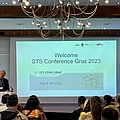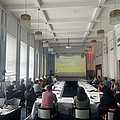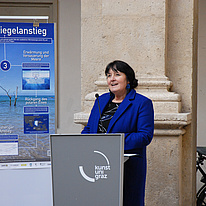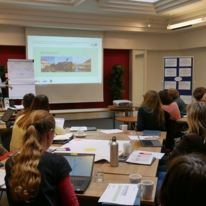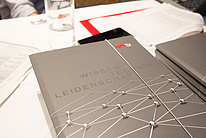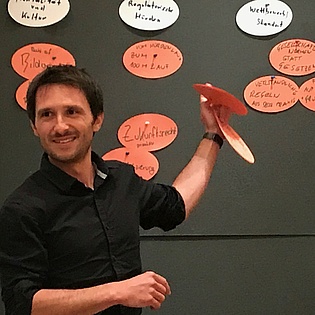STS Confence Graz 2026

22. September 2025
Der Call for Session Proposals für die STS Conference Graz 2026 ist geöffnet.
Noch bis 3. November 2025 können Sessions eingereicht werden.
Nähere Details zum Call finden Sie hier: Call for Sessions
Publikation: Futures Thinking
15. September 2025
In seinem Buch geht Christian Dayé von der Annahme aus, dass Zukunftsdenken schwierig, aber dennoch existenziell notwendig ist. Zudem sei es wichtig zu verstehen, woher die Zukunftsbilder stammen, die derzeit in unseren Kulturen und Gesellschaften kursieren.
Dieses Buch behandelt zwei Bereiche der Sozialwissenschaften, die sich auf Zukunftsforschung und Zukunftssoziologie konzentrieren. Nach einer Betrachtung der historischen Gründe für diese zweigeteilte akademische Institutionalisierug untersucht das Buch, wie eine sinnvolle Arbeitsteilung zwischen den beiden Bereichen erreicht werden könnte und die auch den gesellschaftlichen und zivilisatorischen Bedürfnissen unserer Zeit gerecht werden.
STS Conference 2025 - DANKE!
9.Mai 2025
Wir bedanken uns bei allen Teilnehmer:innen der diesjährigen STS Conference Graz. Die vielen Beiträge, Diskussionen und der Austausch mit Ihnen allen war eine Bereicherung und wir freuen uns auf die nächste Konferenz im Mai 2026.
Eröffnung der STS Conference 2025

Wir freuen uns bei der Eröffnung der heutigen STS Conference 2025 wieder zahlreiche Teilnehmer:innen in Graz begrüßen zu dürfen.
Nach der Eröffnung durch Günter Getzinger, Leiter der STS Unit sowie Vizrektor Michael Monsberger, folgte die Eröffnungskeynote von Kean Birch, The Rise of the Oligarchy.
Ringvorlesung „Vielfalt im Zentrum der Forschung“
17. März 2025
Wissenschafter*innen aller sieben Fakultäten der TU Graz bieten im Rahmen dieser öffentlichen Ringvorlesung von März bis Juni 2025 wieder spannende Einblicke in ihre aktuelle Forschung. Sie zeigen anschaulich, wie sie Diversität adressieren und daraus einen Mehrwert für ihre Forschung gewinnen.
Die sieben Vorträge und die Abschlussdiskussion richten sich an die TU Graz, interne und externe Öffentlichkeit sowie an Studierende aller Fachrichtungen.
Studierende können die Ringvorlesung als Teil des gleichnamigen Seminars von Ao.Univ.-Professorin Christine Wächter besuchen (706.079, 2 ECTS) und für das Schlüsselzertifikat Social Skills and Diversity anrechnen lassen.
Im Anschluss an die Vorträge und die moderierte Diskussion durch Dr.in Karin Grasenick bietet sich Gelegenheit zum informellen Austausch und zur Vernetzung.
Anmeldung erbeten: ringvorlesung.diversitaet@tugraz.at
Termine der öffentlichen Ringvorlesung
24. März, 17:30-19:00 Uhr
Diversitätsaspekte in der Fahrzeugentwicklung
Cornelia Lex, Institut für Fahrzeugtechnik
BMTEG038, Stremayrgasse 16/EG, 8010 Graz
27. März, 17:30-19:00 Uhr
Vielfalt in der Hochfrequenztechnik: Nachhaltige Lösungen durch interdisziplinäre Ansätze
Jasmin Grosinger, Institut für Hochfrequenztechnik
AT01036, Rechbauerstraße 12/I, 8010 Graz
10. April, 17:30-19:00 Uhr
Erfassung und Auswirkung der weltweiten Gletscheränderungen – Methodische und Diversitätsaspekte
Tobias Bolch, Institut für Geodäsie
AT01036, Rechbauerstraße 12/I, 8010 Graz
24. April, 17:30-19:00 Uhr
Auditing algorithms and assessing their impact using (synthetic) network data (English Talk)
Lisette Espín-Noboa, Institute of Human-Centered Computing
AT01104, Rechbauerstraße 12/I, 8010 Graz
19. Mai, 17:30-19:00 Uhr
Zur Vielstimmigkeit des Raums
Franziska Hederer, Institut für Raumgestaltung
AT01098, Rechbauerstraße 12/I, 8010 Graz
22. Mai, 17:30-19:00 Uhr
Food flavour – do we all perceive the same? (English Talk)
Barbara Siegmund, Institute of Analytical Chemistry and Food Chemistry
AT01098, Rechbauerstraße 12/I, 8010 Graz
2. Juni, 17:30-19:00 Uhr
Life before the impact
Dorothee Hippler, Institut für Angewandte Geowissenschaften
AT01104, Rechbauerstraße 12/I, 8010 Graz
26. Juni, 17:30-19:00 Uhr
Wie viel Vielfalt braucht die Forschung in Zukunft?
Abschlussdiskussion mit Christine Wächter & Vortragende der Ringvorlesung
AT01036, Rechbauerstraße 12/I, 8010 Graz
Neues Forschungsprojekt: 3DPharmHSI – Personalized Medicines

3. März 2025
Mitte Januar 2025 wurde ein neues, dreijähriges Kooperationsprojekt gestartet, das die Aktivitäten der STS-Einheit auf den Bereich Pharmatechnik ausweiten wird.
Der 3D-Druck pharmazeutischer Produkte ist ein innovatives Herstellungsverfahren zur Herstellung maßgeschneiderter pharmazeutischer Produkte in kleinem Maßstab. Als wichtiger Bestandteil der personalisierten Medizin ermöglicht es die Anpassung von Dosierung und Form der Tabletten an die Patientenbedürfnisse. Dieser Herstellungsprozess ist eng mit Innovationen wie Echtzeit-Qualitätstests (RTRT), dem Einsatz von maschinellem Lernen und digitalen Arbeitsabläufen verknüpft und bietet die Möglichkeit, Tablets außerhalb spezieller Fabriken herzustellen.
Die Arzneimittelgesetzgebung und -Richtlinien der EU sind jedoch noch nicht so weit entwickelt, dass sie ausreichende Leitlinien für die Weiterentwicklung und Nutzung dieser Technologie bieten können.
An dieser Stelle setzt das Projekt „3DHSIPharm – Personalisierte Arzneimittel“ an. Durch den Entwurf, die Implementierung und den Test eines Modellsystems zielt das Projekt darauf ab, die drängendsten regulatorischen Herausforderungen zu identifizieren und in einem Co-Creation-Prozess Empfehlungen zu entwickeln, wie vereinbarte Regulierungsprinzipien auf den 3D-Druck angewendet werden könnten.
Die technischen F&E-Schritte werden gemeinsam vom Research Center Pharmaceutical Engineering (RCPE) und zwei KMU-Partnern durchgeführt.
Die STS-Einheit leitet unter Armin Spök ein Arbeitspaket, das darauf abzielt, Lücken in den Regulierungsrichtlinien zu identifizieren und Schritte zur Schließung dieser Lücken zu unternehmen.
Kontakt STS Unit: Armin Spök
Fördergeber: FFG-Programm Digitale Technologien
Kick-Off Meeting des Projektes EDUPED
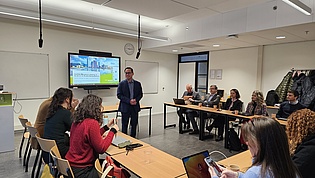
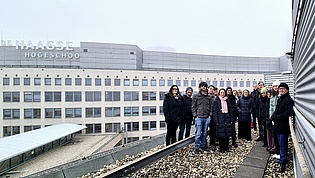
23. Jänner 2025
Unser Teammitglied Anna Schreuer hat von 21.-22. Jänner 2025 am Kick-Off Meeting des Projektes EDUPED – Educational Campuses as the Drivers of Positive Energy Districts in The Hague teilgenommen. Unter der Leitung der Hague University of Applied Sciences (THUAS), zielt das Projekt darauf ab, den Übergang zu „Positive Energy Districts“ (PEDs) durch die systematische Anwendung morphologischer Ansätze für die Stadterneuerung und -sanierung zu beschleunigen. Das Projekt nutzt die Hebelwirkung von Bildungseinrichtungen mit beträchtlichen Gebäudebeständen als Treiber und Wissensdrehscheibe für den Übergang zu PEDs.
Call for Abstracts

21. Jänner 2025
Der Call for Abstracts für die STS Conference Graz 2025 wurde bis 31. Jänner 2025 verlängert.
Keynotespeaker 2025: Elena Esposito, Kean Birch, Harald Rohracher
Christian Dayé wurde Vorstandsmitglied der STS Austria
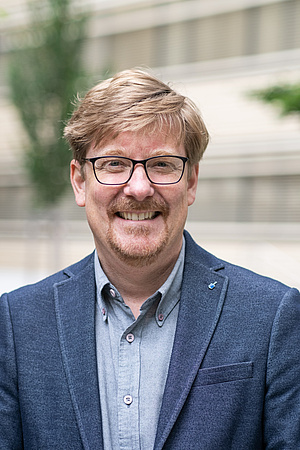
20. Dezember 2024
Bei ihrer diesjährigen Generalversammlung in Wien wurde Christian Dayé in den Vorstand der STS Austria - Österreichische Gesellschaft für Wissenschafts- und Technikforschung gewählt.
Wir gratulieren herzlich!
Call for Session Proposals

24. September 2024
Der Call for Session Proposals ist von 24. September bis 5. November geöffnet.
Treibhausgasemission - STS Conference Graz 2024
7. August 2024
Für die STS Conference Graz 2024 haben wir die von den Teilnehmern zurückgelegten Distanzen abgeschätzt und die Treibhausgase (Kilogramm) berechnet, die sie auf ihren Reisen nach Graz und zurück in die Heimat ausgestoßen haben.
Wir freuen uns sehr, dass nur ein Drittel der von den Teilnehmer:innen zurückgelegten Kilometer mit dem Flugzeug, und 62 % der Kilometer mit öffentlichen Verkehrsmitteln (Bahn, Bus) zurückgelegt wurden.
Dennoch wurden durch Reisen noch immer 61 Tonnen CO₂ ausgestoßen. Davon entfielen fast 90 % auf Reisen mit dem Flugzeug.
Unser Ziel für die STS-Konferenz 2025 (5.-7. Mai 2025) ist es, die Treibhausgasemissionen durch Reisen unter 50 Tonnen CO₂e zu halten.
Poster Award für Anna Semenko
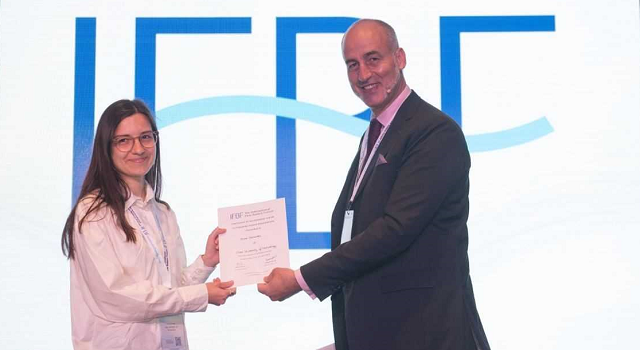
19. Juli 2024
Herzlichen Glückwunsch an Anna Semenko zum Poster Award (VanillaFlow - EIC pathfinder project) im Rahmen des IFBF - International Flow Battery Forums, das von 25.-27. Juni 2024 in Glasgow stattgefunden hat.
Symposium zu Christian Dayés Buch
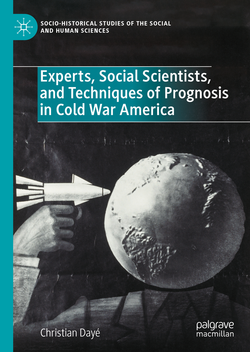
12. Juni 2024
Die Zeitschrift The American Sociologist hat gerade ein Symposium über Christian Dayés Buch Experts, Social Scientists, and Techniques of Prognosis in Cold War America veröffentlicht, das 2020 bei Palgrave Macmillan erschienen ist.
Die Beiträge kamen von einer illustren Runde hochrangiger Wissenschaftler:innen: Naomi Oreskes, Jamie L. Pietruska, Anne Warfield Rawls, Kerstin E. Cuhls, Karlheinz Steinmüller, Lukas Griessl, Stephen Turner und Rose M. Brewer.
Weitere Details: https://link.springer.com/journal/12108/volumes-and-issues/55-2
STS Conference Graz 2024
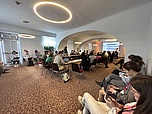
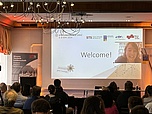
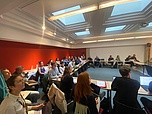


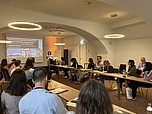
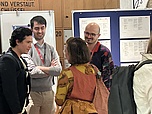
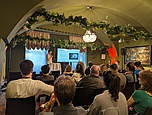
13. Mai 2024
Danke an alle Teilnehmer:innen der diesjährigen STS Conference Graz!
Save the date: STS Conference Graz 2025, May 5-7
Vortrag - Michael Kriechbaum: Schlüssel zur Energiewende? Wasserstoffzukünfte im Kontext nationaler Klimaschutzziele

23. April 2024
Im Rahmen des Energiecamps der Holzwelt Murau, Wasserstoff – Power für den Wandel?, 25. und 26. April 2024, hält unser Kollege Michael Kriechbaum am 25. April um 14 Uhr einen Vortrag zum Thema: Schlüssel zur Energiewende? Wasserstoffzukünfte im Kontext nationaler Klimaschutzziele.
Alle Vorträge und Diskussionsrunden werden im Livestream übertragen.
Das gesamte Programm finden Sie hier
IAS-STS Fellowship Programm

28. März 2024
Bewerbungen für das IAS-STS Fellowship Programm können von 15.März bis 15. Mai 2024 eingereicht werden.
Nähere Informationen finden Sie hier
Besuch des Vizerektors für Infrastruktur und Nachhaltigkeit, Michael Monsberger
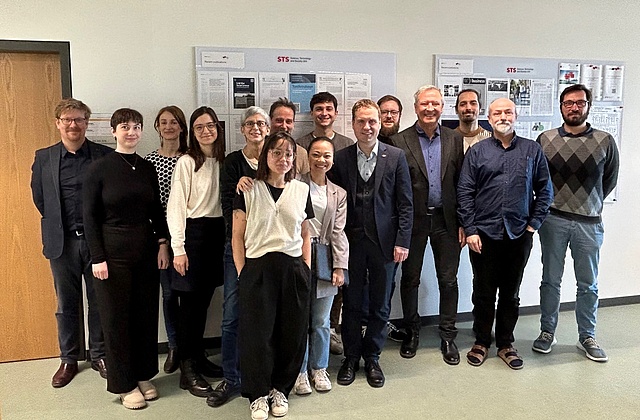
22. Jänner 2024
Es war uns eine Ehre und große Freude dem VR für Infrastruktur und Nachhaltigkeit, Univ.-Prof. Dipl.-Ing. Dr.techn. Michael Monsberger, am 16. Jänner unsere STS-Unit näher vorstellen zu dürfen.
Wir freuen uns über eine gute Zusammenarbeit!
Wir heißen unsere neuen Mitarbeiterinnen herzlich Willkommen!
8. Jänner, 2024
Wir freuen uns, dass Anna Semenko, Julia Wenger und Lilia Yang seit Jänner 2024 dem Team der STS-Unit angehören.

Sustainability4U Ringvorlesung

18. Dezember 2023
Unter dem Motto "ES REICHT" Reduktion als kollektives Handeln" finden auch im Wintersemster 2023/24 unter der Federführung der steirischen Hochschulen wiede eine Ringvorlesung statt.
Günter Getzinger hält am 10.1.2024 an der TU Graz, Alte Aula einen Vortrag zum Thema "Gehen" und der Fußgängerstrategie des Landes Steiermark.
Studierende und alle interessierten Personen sind dabei bei freiem Eintritt herzlich eingeladen.
Die Veranstaltung kann auch im Livestream besucht werden:
https://tugraz.webex.com/tugraz/j.php?MTID=m2fc13d945d4bd4ceea4bf21009299ca9
Webinar number:
2732 116 4429
Webinar password:
X2qiqMuPc34 (92747687 from phones and video systems)
Join by phone
+43-720-815221 Austria Toll
+44-20-3478-5289 United Kingdom Toll
Access code: 273 211 64429
Proceedings der STS Conference Graz 2023

15. Dezember 2023
Die Proceedings zur STS Conference Graz 2023 sind nun online.
Günter Getzinger im Gespräch mit der Andritz AG
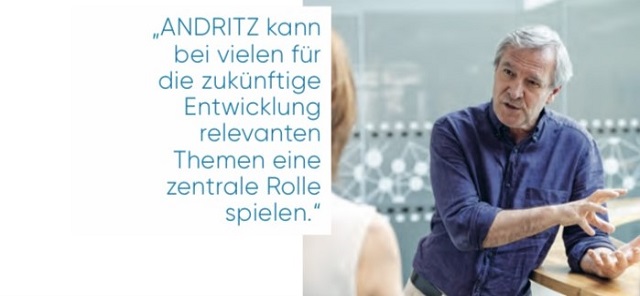
24. November 2023
Günter Getzinger spricht in einem Interview mit der Andritz AG über CO2-Emissionen und der Weg in Richtung Klimaneutralität. Fragen, auf die im Rahmen dieses Interviews näher eingegangen wurde sind: Wie beginnt bei einem Unternehmen der Weg zur Klimaneutralität ? Worauf ist im Rahmen der Beschaffung zu achten? Welche Maßnahmen kann man setzen, um die Emissionen zu reduzieren und am Ende klimaneutral zu werden?
Call for Abstracts - STS Conference Graz 2024

27. November 2023
Der Call for Abstracts ist nun geöffnet.
Bis inkl. 22.1. 2024 können Abstracts eingereicht werden. Wählen Sie dazu bitte eine der folgenden Sessions aus, die sich mit "Criticical Issues in Science, Technology and Society Studies" befassen.
Neue Gentechnik – gesellschaftliche Akzeptanz im Wandel?
13. November 2023
Die seit Ende der 80er Jahre geführte kontroversielle Diskussion über den kommerziellen Einsatz der Gentechnik in der Landwirtschaft ist bislang nicht zur Ruhe gekommen. In vielen Ländern Europas führten gentechnik-kritische Kampagnen u.a. zu gentechnikfreien Regionen und gentechnik-frei Kennzeichnungen. Die sich in diesem Gefüge verfestigende politischen Haltung war in den meisten Ländern zurückhaltend bis stark ablehnend, vor allem in Österreich. Mit der CRISPR-Methode, der sogenannten „neuen Gentechnik“, kommt nun wieder Bewegung in diese festgefahrene Debatte - und ausgerechnet die jüngsten Krisenerfahrungen durch die COVID-Pandemie und Extremwetterlagen und deren Auswirkungen auf die Lebensmittelversorgung sorgen für eine neue Dynamik.

Mehr Informationen:
Gastkommentar von Dr. Armin Spök (APA-Meldung - Science, vom 13.11.2023).
International STS Workshop: Sociotechnical Change in Perspective

9. Oktober 2023
Von 18. Bis 19. September 2023 fand an der TU Graz der „International STS Workshop: Sociotechnical Change in Perspective” statt. Das Team der STS-Unit diskutierte aktuelle Fragen mit Kolleg:innen von PaSTIS der Universität Padua. Insbesondere standen dabei Aspekte der Digitalisierung im Vordergrund. Ein weiteres Thema waren Transitionsprozesse im Bereich Energiesysteme. Schließlich komplettierten Beiträge zu Covid-19 und Mobilitätstechnologien das Programm. Die Veranstaltung ist Teil einer längerfristigen Kooperation mit PaSTIS, die im Rahmen von Forschungskooperationen und akademischem Austausch in Lehre und Forschung fortgesetzt wird.
ZTG - Eröffnungsfeier

25. September 2023
Die Technische Universität Graz (TU Graz) und die Universität Graz haben gemeinsam die Interuniversitäre Forschungsplattform „Zukunft – Technik – Gesellschaft“ (Z-T-G) ins Leben gerufen. Die Plattform sucht innovative und nachhaltige Lösungen für drängende Zukunftsprobleme und bündelt die sich ergänzenden Stärken der beiden Hochschulen. In zunächst drei vom Land Steiermark finanzierten Forschungsprojekten erarbeiten Forschende gemeinsam mit Bürger:innen und Stakeholdern aus der Region Zukunftsvisionen in den Bereichen Mobilität, Wasserstoff und Kohlenstoffmanagement.
Im Rahmen der Eröffnungsveranstaltung am 8. September erläuterten Landesrätin Barbara Eibinger-Miedl, Rektor Harald Kainz (TU Graz) und Prof. Alfred Posch (Universität Graz) die Bedeutung der neuen Forschungsplattform für den (Wissens-)Standort Steiermark. Danach stellten die beteiligten Forschenden ihre Projekte im Detail vor.
Call for Session Proposals

20. September 2023
Für die STS Conference Graz 2024 (6.- 8. Mai) können ab nun bis zum 30. Oktober 2023 Panels eingereicht werden.
Um den aktuellen Herausforderungen im Zusammenspiel von Wissenschaft, Technologie und Gesellschaft zu begegnen, schlagen wir eine Reihe von Themenfeldern vor.
Internationational STS Workshop: "Sociotechnical Change in Perspective"
KI designt nachhaltigen Stromspeicher an TU Graz

4. September 2023
In einem internationalen Projekt ensteht auf Basis des für die Stromspeicherung nutzbar gemachten Vanillins ein mit KI optimierter Prototyp eines umweltverträglichen Stromspeichers.
Unter der Leitung von Ulrich Hirn und Stefan Spirk vom Institut für Biobasierte Produkte und Papiertechnik der TU Graz wird nun daran gearbeitet, einen Vanillin-Stromspeicher zu gestalten, der in seiner gesamten Zusammensetzung möglichst nachhaltig und dennoch effizient ist.
Für die technoökonomische und ökologische Überprüfung zeichnet sich ein Team rund um Günter Getzinger, Leiter der Science, Technology and Society Unit der TU Graz, sowie das spanische Unternehmen Biobide verantwortlich.
Call for Papers - 10. Tagung der Österreichischen Gesellschaft für Geschlechterforschung (ÖGGF)
28. Juni 2023
Menschen – Maschinen – Umwelten
Humans – Machines - Environments
10. Tagung der Österreichischen Gesellschaft für Geschlechterforschung (ÖGGF)
MI, 18.- FR 20. September 2024, Universität Graz & Technische Universität Graz
In der feministischen Geschlechterforschung wird spätestens seit den 1980er Jahren danach gefragt, inwiefern die weitreichenden
bio- und informationstechnologischen Entwicklungen der vergangenen Jahrzehnte Transformationen der gesellschaftlichen Arbeitsteilung und der Geschlechterhierarchie(n) zur Folge haben. Die dynamische Verwobenheit von technologischen, sozialen und räumlichen Phänomenen und die konstitutive Bedeutung, die Gender in dieser Konstellation hat, legt dies nahe.
Inzwischen finden wir einschneidende, noch deutlich komplexere und widersprüchliche soziotechnische Dynamiken vor: Die Omnipräsenz von Digitalisierung und Datafizierung, die Weiterentwicklung der Biotechnologien sowie der beschleunigte technologische Wandel der industriellen Produktion und der Dienstleistungswelt, der Energiegewinnung und der Mobilität erfordern es, Geschlecht neu zu verhandeln und Technologien in sozialen, kulturellen und räumlichen Gender-Kontexten zu untersuchen.
Die Tagung der ÖGGF eröffnet zur Bearbeitung dieses Themenbereichs ein Forum für ein möglichst breites Spektrum an Disziplinen
wie auch für genuin inter- und transdisziplinäre Ansätze sowie künstlerische Auseinandersetzungen.
Details:
Kontrollierte Fantasien im Zukunftsfraum
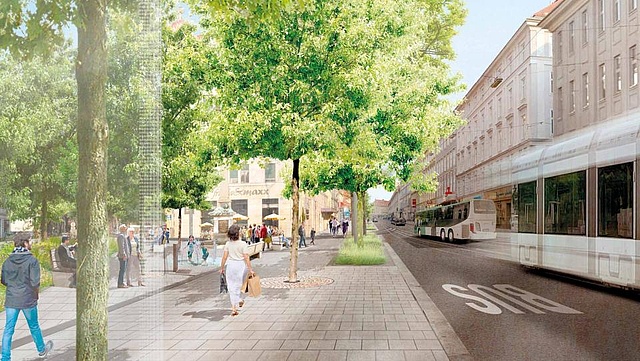
20.Juni 2023
In der aktuellen Ausgabe des Business Monat (Juni/Juli/August 2023) spricht Christian Dayé u.a. darüber, mit welchen Methoden und Vorststellungen wir uns der Zukunft annähern können. Zukunftsbilder, etwa bezogen auf Stadtentwicklung oder Mobilität sind oft so gar nicht radikal sondern vielmehr eine Fortführung bereits bestehender Technikideale.
Universitätskurs "Dekarbonisierung und Nachhaltigkeitsmanagement"
25. Mai 2023
Wir gratulieren den Absolvent:innen des Universitätskurses "Dekarbonisierung und Nachhaltigkeitsmanagement" sehr herzlich.
Der von Life Long Learning (LLL) organisierte und unter der wissenschaftlichen Leitung von Ass.-Prof. Dipl.-Ing. Dr. phil. Günter Getzinger erstmals an der TU Graz abgehaltene Kurs, befähigt Absolventinnen, Ihre Unternehmen auf den Weg zur Klimaneutralität zu führen.
Dieses Jahr stammen die Absolvent:innen aus 8 steirischen Unternehmen, in denen sie tlw. bereits als Nachhaltigkeitsmanager:innen bzw. Umweltmanager':innen tätig sind.
Am 11. September 2023 startet der nächste Kurs.
Weitere Informationen: https://www.tugraz.at/.../dekarbonisierung...
STS Conference Graz 2023
15. Mai 2023
Vielen Dank an alle Teilnehmer:innen der diesjährigen STS Conference Graz. Es war uns eine große Freude, Sie gemeinsam mit dem IFZ Graz bei uns begrüßen zu dürfen.
Viele Diskussionen, Workshops und zwei tolle Keynotes, die uns inspiriert haben. Wir haben die Zeit zum Austausch genossen und freuen uns sehr auf die STS Conference Graz 2024 (6. bis 8. Mai) - #STSgraz2024.
Green Transformation Cards

11. April 2023
Angelika Tisch und Günter Getzinger haben als Autor*innen maßgeblich bei der Gestaltung der Green Transformation Cards in den Kategorien R&D&ecodesign und strategy & reporting mitgewirkt.
Die Green Transformation Cards unterstützen Unternehmen schnell und effektiv auf dem Weg zur Klimaneutralität. In den Green Transformation Cards finden sich 10 Kategorien mit rund 100 Maßnahmenvorschlägen für die grüne Transformation eines Unternehmens. Die Katgorien basieren auf zentrale Geschäftsprozessen wie: Strategie & Reporting, Kulturwandel, F&E & Ecodesign, Einkauf & Lieferkette, Produktion, Gebäude & Infrastruktur, Mobilität, Marketing & Vertrieb, Finanzierung und Geschäftsmodelle. Die Maßnahmen sind leicht verständlich beschrieben und eignen sich sowohl für produzierende Unternehmen als auch für Dienstleistungsunternehmen aller Branchen.
TU Graz am Weg zur Kimaneutralität

15. März 2023
Eine schöne Berichterstattung im ORF Steiermark, in dem Günter Getzinger als Projektleiter Einblicke zum Vorhaben der TU Graz gibt, bis 2030 Klima neutral zu werden.
© TU Graz/www.robertillemann.com
Ringvorlesung: Vielfalt im Zentrum der Forschung
10. März 2023
Wissenschafter*innen aller sieben Fakultäten der TU Graz geben im Rahmen dieser öffentlichen Ringvorlesung Einblicke in ihre aktuelle Forschung. Sie zeigen auf, wie sie jeweils Diversität adressieren & daraus einen Mehrwert für ihre Forschung gewinnen. Die Vorträge richten sich an eine interessierte Öffentlichkeit. Studierende aller Studienrichtungen der TU Graz können die Vorträge als Teil des gleichlautenden Seminars besuchen: Seminar Nr. 706.079 (2 ECTS, freies Wahlfach).
Schlussvortrag, Leitung des Seminars & der Ringvorlesung: Ao.Univ.-Prof.in Dr.in phil. Christine Wächter, STS – Science, Technology and Society Unit am Institute for Interactive Systems and Data Science.
Zeit & Ort: Jeweils mittwochs, 17h30 – 19h00, Seminarraum BMT038, Stremayrgasse 16, EG.
Im Anschluss an den jeweiligen Vortrag und die moderierte Diskussion gibt es Gelegenheit zum informellen Austausch bei Getränken & Snacks.
Anmeldung zu den Vorträgen: ringvorlesung.diversitaet@tugraz.at
Weitere Informationen: QR Code
https://www.tugraz.at/tu-graz/universitaet/leitziele-und-schwerpunkte/diversitaet/diversitaet#c52977

10. Februar 2023
Die Early Bird Registration ist bis 30. März 2023 geöffnet.
Bitte registrieren Sie sich hier für die STS Conference Graz, die von 8.-10.Mai 2023 stattfinden wird.
Vortrag: Was für ein Wissen ist Zukunftswissen? Konturen einer universitären Zukunftsforschung
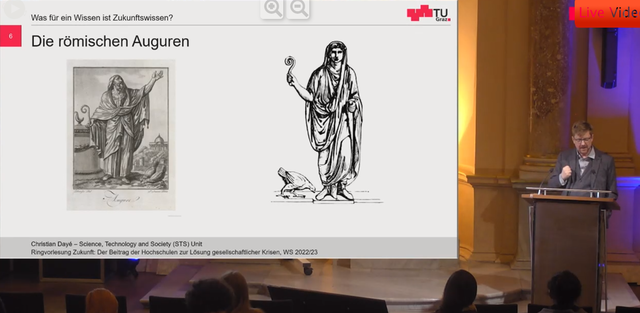
26. Jänner 2023
Am 25. Jänner 2023 fand der Vortrag von Christian Dayé zum Thema "Was für ein Wissen ist Zukunftswissen? Konturen einer Universitäten Zukunftsforschung" in der Aula der TU Graz statt.
Christian Dayé befasste sich dabei u.a. mit folgenden Fragen: Welche Form von Zukunft interessiert uns? Warum ist die Universität der richtige Ort für Zukunftsforschung? Schließlich skizzierte der Vortrag auch, wie Zukunftsforschung gelehrt werden kann.
Der Vortrag war Teil der Ringvorlesung "ZUKUNFT – Der Beitrag der Hochschulen zur Lösung gesellschaftlicher Krisen. Eine Ringvorlesung der neun steirischen Hochschulen" (WS 2022/23).
Mehr Informationen zur Ringvorlesung: Mehr Informationen zu der Ringvorlesung: http://sustainability4u.uni-graz.at/cms/index.php?id=139
Christian Dayé im Portrait
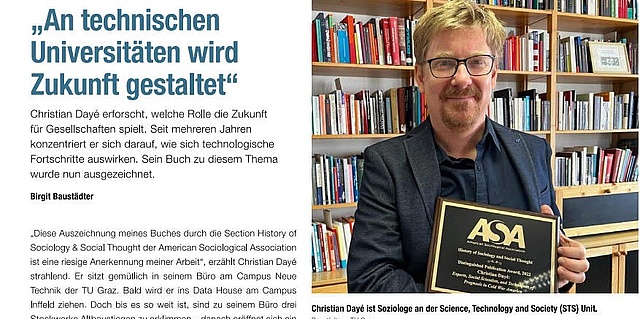
27. Dezember 2022
Christian Dayé forscht an der STS Unit u.a. im Bereich Zukunftsforschung. Mehr zu seiner Tätigkeit und sein Buch, das durch die Section History Sociology&Social Thought der American Sociological Association ausgezeichneet wurde, erfahren Sie im TU Graz research 2022-2/ #28
Transformationen. Sozialphilosophische Perspektiven der Veränderung
5. Dezember 2022
"Transformationen. Sozialphilosophische Perspektiven der Veränderung" nennt sich der neu erschiene Band von Bernhard Wieser, Kirstin Mertlitsch und Arno Bammé.
Dieser Band setzt sich mit aktuellen Transformationsprozessen auseinander: Globale Ereignisse wie Klimawandel, Covid-19 Pandemie, ökonomischer und sozialer Wandel sowie Veränderungen traditioneller Geschlechterverhältnisse werfen Fragen auf, wie diese Veränderungsprozesse verstanden und konstruktiv gestaltet werden können. Die Komplexität dieser Problemstellung erforderte einen inter- und transdisziplinären Zugang, wie er im vorgeschlagenen Band realisiert wird. Die Autor*innen des Bandes diskutieren anhand von konkreten Beispielen zentrale Herausforderungen aktueller Transformationsprozesse und stellen zusammengenommen eine Reflexionsgrundlage bereit, mit der dem beobachteten Wandel begegnet werden kann.
Buchvorstellung im Rahmen der Tagung der Österreichischen Gesellschaft für Soziologie
2. Dezember 2022
Eine Session der diesjährigen Tagung der Sektion Soziologiegeschichte der Österreichischen Gesellschaft für Soziologie am 17. November in Graz war Christian Dayés Buch Experts, Social Scientists, and Techniques of Prognosis in Cold War America gewidmet. Auf eine Vorstellung des Buchs und seiner Thesen durch den Autor folgten Kommentare von Barbara Hönig und Antonia Schirgi. Weitere Informationen sind hier zu finden: https://oegs.ac.at/geschichte-der-soziologie/aktuelles
Wir sind übersiedelt

28. Oktober 2022
Ab nun finden Sie uns im Data House, Sandgasse 36/III, 8010 Graz.
Ringvorlesung 2022: "ZUKUNFT – Der Beitrag der Hochschulen zur Lösung gesellschaftlicher Krisen

27 Septemer 2022
Die neun steirischen Hochschulen (fünf Universitäten, zwei pädagogischen Hochschulen und zwei Fachhochschulen) deren Zusammenarbeit von der Idee eines gemeinsamen Hochschulbewusstseins getragen ist laden im WS 2022/23 zu einer Ringvorlesung unter Federführung von Sustainability4U, der Nachhaltigkeitsplattform der vier Grazer Universitäten, ein.
Unter dem Titel „ZUKUNFT – Der Beitrag der Hochschulen zur Lösung gesellschaftlicher Krisen“ betrachten die Vortragenden aus der Sicht verschiedener Disziplinen, wie diese zu einer nachhaltigen Zukunft und einem nachhaltigkeitsorientierem Bewusstsein beitragen können.
Im Anschluss wird mit dem Publikum diskutiert. Die Vorträge finden jeweils mittwochs um 18:00 Uhr statt.
ABGESAGT
Am 14.12. 2022 wird unser Kollege Mag. Dr. Christian Dayé vortragen:
Was für ein Wissen ist Zukunftswissen? Konturen einer universitären Zukunftsforschung
Ort: HS II (Rechbauerstraße 12, 1. UG), 18:00 Uhr
NEUER TERMIN:
25.1.2023, Aula, Alte Technik, Rechbauerstraße 12, 18:00 Uhr
Mehr Informationen zu der Ringvorlesung: http://sustainability4u.uni-graz.at/cms/index.php?id=139
Call for Session Proposals
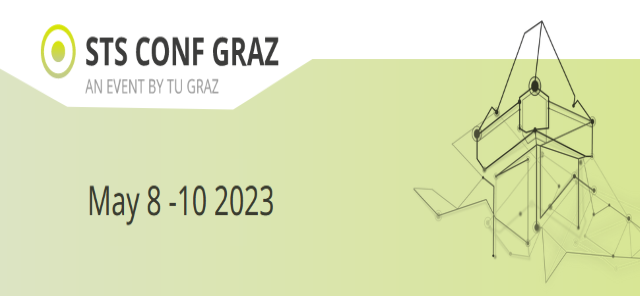
20 September 2022
Wir laden Sie ein, eiin Panel für die kommende STS-Konferenz in Graz einzureichen, die vom 8. bis 10. Mai 2023 stattfinden wird. Wir schlagen eine Reihe von Themenfeldern als Leitfaden vor, um aktuelle Herausforderungen des Zusammenspiels von Wissenschaft, Technologie und Gesellschaft anzugehen. Panel einreichen
Klimaneutrale Universitäten in Österreich

22 Juli 2022
Im GAIA magazin (02/2022) informierten Günter Getzinger und Kollegen über die Bemühungen der Allianz-Hochschulen, klimaneutral zu werden. Immer mehr Mitglieder der Allianz nachhaltiger Universitäten in Österreich entwerfen Roadmaps zur Sicherung der Klimaneutralität in den Jahren zwischen 2030 und bis spätestens 2040. Mit der Absicht, Vorbild und Vorreiter zu sein, treten sie in einen sehr ambitionierten, steilen Dekarbonisierungsprozess ein. Weiterlesen
Energy Globe Award 2022
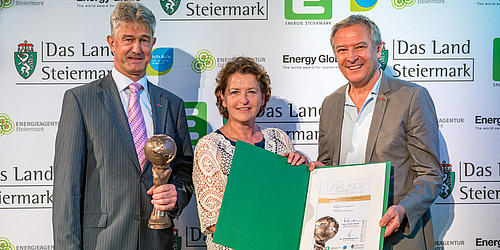
7 Juli 2022
Der Energy Globe STYRIA AWARD zeichnet herausragende steirische Leuchtturmprojekte aus. 52 Projekte nahmen in diesem Jahr am Wettbewerb teil und überzeugten die Fachjury mit Ideenvielfalt und regionalem Know-how. In der Kategorie „Anpassung“ geht der Preis an das TU Graz Projekt: Klimaneutrale TU Graz 2030. Als erste Universität Österreichs hat sich die TU Graz entschieden, bis 2030 klimaneutral zu werden und hat dafür einen ambitionierten Fahrplan verabschiedet. Die Maßnahmen reichen von Energiesparen, Effizienzsteigerung und Eigenproduktion von Ökostrom bis hin zu Gebäuden, Beschaffung und Mobilität. Basis für die Fortschrittsdokumentation ist eine umfassende und präzise Treibhausgasbilanz, die die gesamte universitäre Infrastruktur umfasst und jährlich aktualisiert wird.
Wir gratulieren Günter Getzinger (Project Lead) and Franziska Häller!
STS Klausur



23 Juni 2022
Nach zwei Jahren haben wir endlich wieder eine STS Klausur gemacht. Wir haben diese Zeit gemeinsam mit unseren begeisterten jungen Forscher*innen in einer großartigen Landschaft genossen.
Christian Dayé: Preisträger der Sektion History of Sociology and Social Thought (HOSST) der American Sociological Association

27 Juni 2022
Christian Dayé´s Buch Experts, Social Scientists, and Techniques of Prognosis in Cold War America (Palgrave Macmillan, 2020) wurde zum Mitgewinner des Distinguished Scholarly Publication Award 2022 der Sektion History of Sociology and Social Thought (HOSST) der American Sociological Association ernannt. Wir gratulieren herzlich!
Sustainability Award 2022 - 2nd Place

25 Juni 2022
Im Juni 2022 gewann das Projekt „Klimaneutrale TU Graz 2022“ unter der Leitung von Günter Getzinger und Franziska Häller den Nachhaltigkeitspreis (2. Platz, Handlungsfeld „Verwaltung und Management“). Wir gratulieren herzlich!
Weiterführende informationen zum Nachhaltigkeitsaward 2022.
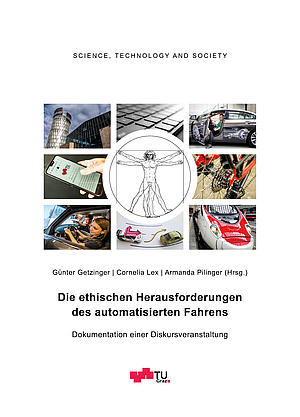
Die ethischen Herausforderungen des automatisierten Fahrens
3 Juni 2022
Im Rahmen der Reihe „Im Fokus“ fand am 11. März 2019 erstmals die Veranstaltung „Ethische Herausforderungen des automatisierten Fahrens“ an der TU Graz statt.
5 Experten, darunter Günter Getzinger, diskutierten ihre Meinung. Im Mittelpunkt der Diskussion standen das Zusammenspiel von technischen Aspekten, wirtschaftlichen Use Cases und die daraus resultierenden Auswirkungen auf die Funktionalität und Nutzung autonomer Fahrzeuge. Ziel der Veranstaltung war es, den Diskurs innerhalb der TU Graz zum Thema Technikfolgenabschätzung zu öffnen.
Diese Publikation stellt die Ergebnisse dieser Veranstaltung einer breiteren Öffentlichkeit vor.
STS Conference Graz 2022 - Danke!

10 Mai 2022
Wir danken allen Teilnehmer*innen und Vortragenden, die die diesjährige STS Konferenz zu einem besonderne Event gemacht haben.
Wir freuen uns auf ein Wiedersehen bei der STS Konferenz 2023 Anfang Mai!
Graz Umwelt Fakten

6 Mai 2022
Die Informationsplattform "Graz Umwelt Fakten" bietet interessierten Bürgerinnen und Bürgern grafisch aufbereitete Informationen zu zentralen Umweltthemen. Sie wurde im Rahmen einer Masterarbeit an der TU Graz (D. Wolf) entwickelt, die von Günter Getzinger, Leiter der STS-Einheit, gemeinsam mit dem Grazer Umweltamt betreut wurde. Kennzahlen aus den Bereichen Klima, Energie, Luft, Lärm, Abfall, Mobilität und Natur geben einen Überblick über die Umweltsituation in Graz und werden je nach Datenlage aktualisiert und erweitert.
STS Conference Graz 2022

29 April 2022
Wir freuen uns über das diesjährige Programm and die Keynotes der STS Konferenz 2022: Andreas Bogner, Sabina Leonelli and Naomi Oreskes
Gaskrise setzt Weichen für die Klimapolitik

24 März 2022
Der Krieg in der Ukraine hat die Schwächen der österreichischen Energieversorgung offengelegt. Günter Getzinger und weitere Expter*innen fordern vor dem Hintergrund der Krise ein sofortiges Umdenken, um die Klimaziele zu erreichen
Mehr Informationen auf orf.at (online: 23. März 2022)
CS Talk #8: Corinna Bath: Reaktionsfähige KI durch Nutzung von Feministischer STS

28 Februar 2022
Wir möchten Sie auf den bevorstehenden CS Talk #8 von einer unserer ehemaligen IAS-STS Fellows Corinna Bath, TU Braunschweig, aufmerksam machen.
18. März 2022 | 11:00, Aula Alte Technik
Rechbauerstraße 12, 8010 Graz.
Aufgrund der aktuellen Situation ist die Anzahl der Plätze bei der Veranstaltung stark begrenzt. Bitte melden Sie sich rechtzeitig hier an.
Abschlussworkshop CLIMATTERS of the DK Climate Change (DKCC) am 3. Februar 2022

27 Jänner 2022
Am 3. Februar 2022 ist Michael Kriechbaum Mitorganisator einer Session zur nächsten Phase der Energiewende. Die Session ist Teil des Abschlussworkshop CLIMATTERS des DK Climate Change (DKCC) und befasst sich mit den Herausforderungen der Integration erneuerbaren Stroms und den Perspektiven von Wasserstoff. Keynotes der Forschungsingenieurin Marta Victoria und des Übergangsforschers Nuno Bento sowie kurze Präsentationen der Organisatoren bilden den Rahmen für eine offene Diskussion. Interessenten sind herzlich willkommen!
Nehmen Sie an der Sitzung teil: 3. Februar, 15:00–17:00 Uhr
https://bit.ly/3IvMYE8
Dynamik des kumulativen Vorteils und Bedrohungen für die Gerechtigkeit in Open Science: eine Scoping-Überprüfung

20 Jänner 2022
Zwei Mitglieder der STS-Unit, Tony Ross-Hellauer und Stefan Reichmann, beide aus dem Projekt ON-MERRIT, das potenzielle Matthew-Effekte beim Übergang zu Open Science und verantwortungsvoller Forschung und Innovation in Wissenschaft, Industrie und Politik untersucht, haben ein Paper im Royal Society Open Science mit dem Titel „Dynamics of cumulative Advantage and Threats to Equity in Open Science: a Scoping Review“ (Ross-Hellauer et al. 2022) veröffentlicht. Darin argumentieren die Autoren, dass der Übergang zu Open Science derzeit wohlhabende Akteur*innen und Institutionen begünstigt, da er auf der Beherrschung der entsprechenden Ressourcen wie Wissen, Fähigkeiten und der Fähigkeit zur Praxis von Open Science basiert.
Mind_the Gap Diversity Award 2021


17 Jänner 2022
Herzlichen Glückwunsch an Anna Napetschnig zum Mind_the Gap Diversity Award 2021 für ihre Masterarbeit „Frauen@TUG – Do IT! Erfolgreiche Ansätze zur Verbesserung der qualitativen und quantitativen Situation von Studentinnen der Informatik an der TU Graz“. Anna Napetschnig arbeitet derzeit an ihrer Masterarbeit in Advanced Material Sciences an der TU Graz.
Christine Wächter von der STS-Einheit war Betreuerin ihrer Masterarbeit in Interdisziplinären Geschlechterforschung.
Anna Napetschnig hat in ihrer Masterarbeit „Frauen@TUG – Do IT“ einen Maßnahmenkatalog zur qualitativen und quantitativen Verbesserung der Situation von Informatik-Studentinnen an der TU Graz entwickelt.
Der erste Teil der Arbeit ist eine Bestandsaufnahme von Projekten zur Förderung junger Informatikstudentinnen an der TU Graz und an vergleichbaren Universitäten. Der zweite Teil besteht aus qualitativen und quantitativen Befragungen von Studentinnen der TU Graz zu diesen Maßnahmen. Daraus ergibt sich ein Maßnahmenkatalog mit individuellen Empfehlungen für die TU Graz, die das Potenzial haben, den Anteil der Informatikstudentinnen zu erhöhen und den Studienabbruch zu reduzieren.
Sie können Ihre Präsentation hier ansehen: https://www.youtube.com/watch?v=z9zaHfpPAbU
Ausstellung: Klimakrise und Bewusstseinswandel
13 Dezember 2021
Neben der Vortragsreihe „KLIMAKRISE UND BEWUSSTSEINSWANDEL“ wurde eine gleichnamige Posterausstellung entwickelt. Gestaltet und inhaltlich entwicklt von David Steinwender.
Mitarbeiter*innen und Studierende der Technischen Universität Graz sind eingeladen, an der Ausstellung teilzunehmen.
17.12.2021 - 28.1.2022: Alte Technik, Rechbauerstraße 12, Tiefparterre, Foyer Hörsaal
28.01.2022 - 11.3.2022: Physikgebäude, Petersgasse 16, Erdgeschoß, Foyer Hörsaal P2
11.03.2022 - 22.4.2022: Foyer Inffeldgasse 25 D, Erdgeschoß.
Virtueller Workshop zu Treibhausgasbilanzierung an Universitäten und Hochschulen

22 November 2021
Am 8. November 2021 fand der letzte Workshop des Projekts „ClimCalc 2.0“ mit 40 Teilnehmenden von 24 verschiedenen Universitäten und Fachhochschulen (davon 5 aus Deutschland) statt. Auch 3 private Institutionen interessierten sich für den Prozess der Treibhausgasbilanzierung und wie das Tool „ClimCalc“ funktioniert.
Nach einer kurzen Einführung für Neueinsteiger*innen wurden die Treibhausgasbilanzen der Donau-Universität Krems und der Universität für Musik und darstellende Kunst Wien vorgestellt und diskutiert. Die Fortschrittsberichte der Teilnehmer weisen darauf hin, dass in den kommenden Monaten noch einige weitere Treibhausgasbilanzen veröffentlicht werden.
Der Workshop gab uns Gelegenheit, das sogenannte „Road-Mapping“ zu erläutern (am Beispiel der TU Graz und der Universität für Bodenkultur Wien), wie und durch welche Maßnahmen eine Hochschule bis 2030 klimaneutral werden kann.
Danke an alle Teilnehmer*innen für den regen Austausch.
Klimabewusstsein und Hypes: Erneuerbare Energien im öffentlichen Diskurs
18 November 2021
Im Rahmen der Ringvorlesung "Klimakrise und Bewusstseinswandel" laden wir Sie herzlich zum Vortrag von Michael Kriechbaum (TU Graz/ Universität Graz) „Klimabewusstsein und Hypes: Erneuerbare Energien im öffentlichen Diskurs“ ein.
Auf Basis von empirischen Untersuchungen wird Herr Kriechbaum die Rolle von Erwartungshaltungen in der Entwicklung und Verbreitung von neuen Technologien erklären sowie das Wesen von technologischen Hype-Zyklen und die damit verbundenen Dynamiken kollektiver Erwartungen.
15.12.2021, 18:00 Uhr
Scientific impact
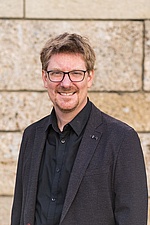
3 November 2021
Der von Christian Dayé aus dem Jahr 2018 veröffentlichte Artikel über die Geschichte der Delphi-Technik als Prognoseinstrument (https://doi.org/10.1177/0306312718798497) gehört zu den zehn meistzitierten Publikationen, die in den letzten drei Jahren in Social Studies of Science, einer der renommiertesten Zeitschriften in STS, veröffentlicht wurde.
Wir gratulieren herzlich!
Betriebsausflug 2021

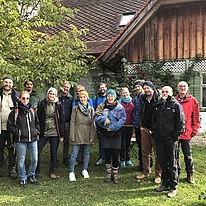

18 September 2021
Gemeinsam mit dem Team des IFZ Graz haben wir einen wunderbaren Tag in der Südsteiermark verbracht.
Networking, Teambuilding, Bewegung und eine atemberaubende Umgebung genießen: Was für eine großartige Kombination!
Climate Crisis and Awareness

October 6, 2021
Climate change presents our modern societies with unprecedented challenges.
In addition to the use of new technologies, a fundamental change in human behavior patterns and the reorientation of existing systems are required. Research and innovation play an important role alongside education and a broad change in awareness.
On nine evenings - every Wednesday from 6:00 p.m to 8:00 p.m. - students and the general public are offered a discussion platform that is intended to contribute to sustainability-oriented awareness. All lectures are open to the public with free admission.
A poster poster exhibition on the same topic complements the lecture series. Between October 2021 and February 2022, information boards will be installed in parallel at the locations of the nine Styrian universities to raise awareness of the topic. The twelve posters are also available online.
STS Courses winter term 2021/22

September 23, 2021
Take a look at our courses regarding Technology and law, society & sustainable technology design or gender & technology.
STS courses

September 17, 2021
We are happy about a comprehensive report in the Wing Business issue (2/21) on climate neutrality using the example of Graz University of Technology
Universities must act as role models

August 24, 2021
Günter Getzinger points out the important role Universities have als role model in terms of climate protection: "We want to set a good example and show our students that it is possible to get involved on an institutional and personal level."
At the TU Graz will be made ambitous steps for the the goal to achieve climate-neutrality in 2030, created against the backgrpound of the Paris Climate Agreement.
Digitalisierungschancen steirischer Universitäten
July 12, 2021
A Webinar was held in the framework of Pfingstdialog Geist und Gegenwart 2021.
The research team of the STS-Unit at ISDS at Graz University of Technology contributed to this year’s Pfingstdialog on “Reset Europe” taking place at Schloss Seggau from 20-21 May 2021 with a webinar addressing the university as a social space. With this contribution the research team of the STS-Unit invited an interested audience to reflect on processes of digitalisation triggered by the recent covid-19 pandemic. As the results of an empirical study suggest, digital technologies are predominately used as measures to cope with the perceived covid-19 crises. At the same time the importance of the university as a social space come to the fore. Against this backdrop the webinar addresses opportunities of digital technologies for teaching, research and administration in the university context.
The Project Digitalisierungschancen steirischer Universitäten studies experiences with Covid-19 induced digitalisation processes and explores opportunities of further developments of Styrian universities. Based on the empirical analysis the project seeks to provide a knowledge basis for the application of digital technologies in teaching, research and administration. In such a way the research carried out contributes to the resilience of the universities and future-oriented developments of commerce and industry in Styria.
Call: Land Steiermark “Aus der Corona-Krise lernen!”
Duration: 1.10.2020 – 30.9.2021
Funding: € 69.599,09
PI: Univ.-Prof. Dr. Stefanie Lindstaedt, ISDS, TU-Graz
Team: Bernhard Wieser, Viktoria Pammer-Schindler, Christian Dayé, Mia Bangerl, Marion Rowies, Kübra Karatas, Franziska Gürtl
Between administration and research

June 1, 2021
Two members of the STS Unit, Stefan Reichmann and Tony Ross-Hellauer, recently collaborated on an article that has just been published in the Journal of the Association for Information Science and Technology (JASIST): https://asistdl.onlinelibrary.wiley.com/doi/10.1002/asi.24492 The paper is based on a survey of data practices of scientists and engineers and finds that Research Data Management (RDM) “leads a double life among researchers: both as an acknowledged aspect of research as well as a menial administrative task...Our findings suggest that RDM is more readily interpreted as an administrative task than as a part of good research practice."

May 25, 2021
On May 25, Günter Getzinger gave a lecture at the DorfUni on "PlatzFairTeilen - Community policy for pedestrians."
More information can be found here: dorfuni.at/webinar-sanfte-mobilitaet-und-wenig-verkehr/
3rd (H) TU Day of Sustainability
May 19, 2021
On May 19, Günter Getzinger moderated the Sustainability Lecture of Graz University of Technology and the subsequent panel discussion (as part of the 3rd Sustainability Day of the (H) TU).
Further information: https://www.tugraz.at/tu-graz/organisationsstruktur/beiraete/nachhaltigkeitsbeirat/woche-der-nachhaltigkeit/
New book
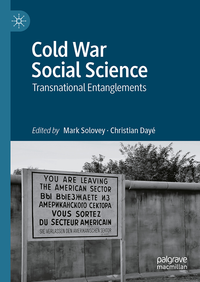
May 18, 2021
Christian Dayé is the co-editor, together with Mark Solovey (UToronto), of a volume on Cold War Social Science: Transnational Entanglements that appeared in May 2021 with Palgrave Macmillan.
This book explores how the social sciences became entangled with the global Cold War. Considering developments in a wide array of fields – anthropology, development studies, economics, education, political science, psychology, science studies, and sociology – that involved the movement of people, projects, funding, and ideas across diverse national contexts, this volume pushes scholars to rethink certain fundamental points about how we should understand – and thus how we should study – Cold War social science itself.
More information can be found here: https://www.palgrave.com/de/book/9783030702458
NTA9-TA21- Conference
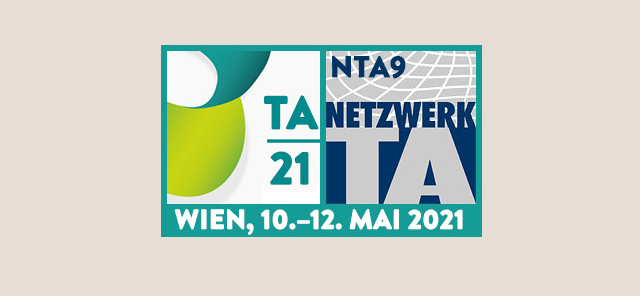
May 7, 2021
From May 10-12, 2021 the the NTA9-TA21 Conference will take place virtual:
Digital, direct, democratic? Technology Assessment and the Future of Democracy.
Opening STS Conference Graz 2021
May 3, 2021
Günter Getzinger, Head of the STS Unit, opens the STS Conference Graz 2021.
We are exited about the opcoming three conference days with lot´s of interesting presentations and discussions.

April 27, 2021
The IAS-STS invites researchers to apply for a stay between 1 October 2021 and 30 June 2022 as a research fellow (up to nine months) or visiting scholar (shorter period, e.g. one month)!
Application Deadline: June 15, 2021
For application forms and further information please visit: IAS-STS.
STS Conference Graz 2021

April 26, 2021
We are looking forward to the upcoming STS Conference Graz 2021, held virutally from May 3-5.
The annual STS conference provides space for international scholars to discuss their topical research amongst peers. The contributors to this event address the complex ways in which science, technology and society co-evolve and mutually shape one another. In such a way, the participants of the conference aim to provide a better understanding of the world in which we live. This includes the assessment of emerging technologies, the scrutiny of ethical, legal and social aspects of contemporary scientific practices as well as the transition to environmentally friendly and socially desirable techno-scientific futures.
Lecture series 'Diversity in Research @TU Graz'

March 3, 2021
Headed by Ao. Univ.-Prof.in Dr.in phil. Christine Wächter a lecture series 'Diversity in Research @ TU Graz' will start on March 10, 2021.
Lectures from all seven faculties give insights into the developments, findings and applications of diversity aspects in science and technology at Graz University of Technology. In addition to the students who are registered for the course of the same name, interested TU Graz members can also attend the individual lectures.
The lectures will take place every second Wednesday from March 10th, from 5:30 p.m. to 7:00 p.m., initially digitally. Five of the lectures are in German, two in English.
March 10, 2021: Assoc.Prof. DI Dr.techn. Mario Hirz | The change in the automotive industry - influences and effects under diversity aspects
TU Graz on the way to becoming Austria's first climate-neutral university

March 1, 2021
TU Graz takes its social responsibility in terms of climate protection seriously and has adopted an ambitious roadmap for its path to climate neutrality by 2030 The strategy was presented today by Rector Harald Kainz, Vice-rector Horst Bischof, moderated by the ead of the STS Unit, Günter Getzinger in presence of Climate Protection Minister Leonore Gewessler and Regional Research Councilor Barbara Eibinger-Mied
Kleine Zeitung Article
Standard Article
Virtual Workshop for the training program ”Young Energy Professionals (YEP)” of the “World Energy Council Austria (WEC)

February 11, 2021
On February 4, 2021, the STS Unit conducted a virtual future workshop held by Günter Getzinger and Jürgen Suschek-Berger as kick-off event for the training program “Young Energy Professionals (YEP)” of the “World Energy Council Austria (WEC)”. The World Energy Council Austria is the Austrian representative of the worldwide international organization World Energy Council, which has existed since 1923 and is based in London.
The YEP come from all areas of the energy industry, energy policy and research, and the program gives them the unique opportunity to network with colleagues from other industries. Almost 50 of them took part in this future workshop, got to know each other and worked together in six groups on topics related to the current problems of energy companies, the future of energy and new energy projects. Based on this workshop the YEP will work on positive future prospects for a sustainable energy over the next two years.
Book review by Nicki Lisa Cole

February 11, 2021
Book review by Nicki Lisa Cole in New Politics, Vol. XVIII No. 2, Whole Number 70 is out now: China´s Workers Battle Apple and Foxconn
Gender and Diversity Competence for Scientists
February 8, 2021
The pilot course "Gender and Diversity Competence for Scientists" at Graz University of Technology has been successfully completed in October 2020. Together with Gabi Burgstaller, Günter Getzinger designide a mode titeld: "Technology in the field of tension between science, politics and economics".
With a short image video we would like to draw your attention to the course that will start in Autumn 2021: https://www.youtube.com/watch?v=JbIG-yn0n7Y
STS Unit becomes member of the NTA network

February 3, 2021
In December 2020, the Science, Technology, and Society Unit was presented by Armin Spök at the annual meeting of the Network Technology Assessment (NTA) and was accepted as an institutional member.
The network, which has existed since 2004, currently comprises 55 institutional members from Germany, Austria and Switzerland as well as around 400 personal members.
The aim of the network is to promote cooperation among TA researchers and to promote TA in science, politics, and business. The network holds a scientific conference every two years and an annual membership meeting.
In addition, workshops are held by working groups of the NTA or in cooperation with the NTA.
Further information: https://www.openta.net
TU Graz becomes climate neutral in 2030
January 25, 2021
Günter Getzinger leads the project `climate neutral TU Graz 2030`. As deputy chairman of the sustainability advisory board he and Alexander Passer as chairman of that advisory board, played a leading role in creating a roadmap for the climate-neutral TU Graz (people TU Graz # 76, 2020-4, page 4-5).
Together with all employees TU Graz wants to achieve the climate goals. A roadmap with concrete measures paves the way for the climate-neutral Graz University of Technology in 2030.
Christian Dayé: International Fellow at the 'Science in Circulation Group' , UNIFESP, São Paolo
January 13, 2021
Christian Dayé has been appointed as international fellow of the newly founded group “Science in Circulation (SciCi)” at the Instituto de Estudos Avançados e Convergentes (Institute of Advanced and Converging Studies), Universidade Federal de São Paolo UNIFESP (https://ieac.unifesp.br/scici).
Composed by local and international researchers, the SciCi-group will explore the transnational circulation of scientific ideas, instruments, and organisations by following a range of individual projects and meeting regularly to discuss the progress. Christian’s project focuses on how at the International Institute of Systems Analysis (IIASA), a research organization founded in the later decades of the Cold War, the term system was used as an enabler of exchange across disciplines as well as political boundarie
Sustainability & Climate Protection at Universities
December 22, 2020
On December 2, 2020, Graz University of Technology invited the nine members of the Styrian University Conference (that is, all Styrian Universities, University Colleges of Teacher Education and Universities of Applied Sciences) to a virtual workshop entitled "Sustainability & Climate Protection at your own College / University".
The aim of the workshop was to get to know the activities of the various universities in the field of sustainability and climate protection, to exchange experiences and to initiate possible collaborations. In addition to presentations and lectures, there were many opportunities for interaction and discussion.
Two possible co-operation projects that arose in the workshop are the installation of a group on the subject of “Cycling between the universities of Graz” and a group on the subject of “Greenhouse gas balance / Climate neutrality”.
Happy Retirement

December 7, 2020
We wish our longtime employee Monika Trinkaus all the best on her retirement and good luck and relaxation in this new phase of life!
Nicki Cole: Winner of the Mind the Gap Award
November 19, 2020
We are happy to announce that Nicki Lisa Cole is one of five winners of this year's `Mind the Gap' Award for Equal Opportunity.
Nicki examined global (in)distributive justice using the example of electronics supply chains.
She researched who produces for whom under which circumstances and to what extent the companies involved keep their promises of social responsibility – a hot topic in view of increasing digitalization and the electronic devices produced for it.
Cole approached the subject from the point of view of ethnicity and economic class and presented her results as an invited panellist for the panel "Digitalisation and (Global) Equity: Who benefits, who loses?", part of the annual ICT For Sustainability Conference.
An Ethic of Sustainability is needed

November 18, 2020
In " Der Standard. Forschung aktuell " Günter Getzinger explains how sustainability is ethically based and how it can find entrance in society and its institutions such as universities. Read more
Mind the Gap Jury

November 12, 2020
Günter Getzinger is member of the Mind the Gap Jury. Together with Vice Rector Horst Bischof, Vice Rector Stefan Vorbach, Barbara Herz and Cornelia Lex this jury honores employess and students who had put human diversity at the center of their theses, research or teaching!
Every year teams or individuals will be awarded a “Mind the Gap” prize for their work in the categories “Scientific theses”, “Research project”, “Conference contribution, lecture, publication” and “Dissertation”. Teaching content or methods, further training and non-scientific projects are also accepted.
Climate-neutral TU Graz 2030

November 5, 2020
Graz University of Technology accepts its social responsibilty in terms of climate protection and has adopted a roadmap for the path to climate neutrality by 2030.
Packages of measure among others are
Energy: Electricity UZ46, further switch to heat pump 0.7
Building: Reduction of CO2 footprint in construction
Mobility: E charging infrastructure, promotion of bicyles and public transport use, expansion of e-charging stations, etc.
Business trips: Infrastructure video conferencing, promotion of night trains, long-distance trains, "stay grounded - keep conected"
Climate change adaptation: Greening measures at all TU locations
TU Graz is member of the Alliance of Sustainable Unverstities in Austria as well of the CCCA - Climate Change Centre Austria, and has furthermore its own Sustainability Advisory Board
Contact:
Günter Getzinger
getzinger@tugraz.at
The American Sociologist

November 4, 2020
Christian Dayé is now member of the editorial board of the journal "The American Sociologist".
Reflections on Energy System Transitions

October 28, 2020
Kapil Narula (Visiting Scholar at IAS-STS 2020) is talking about decarbonizing heating in Austria with Christian Holter (SOLID Solar Energy Systems GmbH) and Günter Getzinger (TU Graz).
See the full interview here
STS - Science, Technology and Society Certificate

September 22, 2020
A deeper understanding of the fundamental importance of science and technology for contemporary societies, entrepreneurial action and thinking, intercultural and gender skills, languages and - these are key competencies that are expected from university graduates today.
Graz University of Technology offers a wide range of courses, particularly in the area of freely selectable courses. With the start of the winter semester 2020/21, certificates will also be issued that prove these competencies.
For this purpose, Graz University of Technology offers its students “tracks” in which courses that are sensibly related together deal with a complex topic.
We are happy to offer you information to the STS - Science, Technology and Society Certificate
Basic (16 ECTS) and Advanced (32 ECTS)
Students of the “Science, Technology and Society” (STS) certificate acquire a deeper understanding of the fundamental importance of science and technology for contemporary societies. This certificate is interdisciplinary and based on the internationally established subject "Science, Technology and Society Studies". On this basis, it offers concrete links to all studies at the Graz University of Technology. The certificate is intended to enable graduates to contribute responsibly to overcoming societal challenges and to the prosperous development of the economy, society and the natural environment.
Dilemmas of Open Science – Between Uptake and Rigor

September 1, 2020
Stefan Reichmann presented a paper entitled “Dilemmas of Open Science – Between Uptake and Rigor” (co-written by Bernhard Wieser) at the 4S/EASST conference on Wednesday 19 August 2020: https://easst.net/easst-4s-2020/ The paper was submitted as part of disseminating preliminary results of the Horizon2020 project ON-MERRIT (on-merrit.eu/) where the STS Unit is leading a work package on the uptake of Open Science outputs by policy makers. The conference was fully online.
Nicki Cole at the 7th ICT4S

August 31, 2020
Nicki Cole was invited as panelist at the ICT - INTERNATIONAL CONFERENCE ON ICT FOR SUSTAINABILITY on the panel topic "Digitalisation and (Global) Equity: Who benefits, who loses?
Panel discussion, recovered live, where Nicki Cole was feature alongeside other experts can be watched here
Courses - Winter term 2020/21

August 23, 2020
The courses of the STS Unit deal with the diverse relationships between science, technology and society. Our teaching philosophy is to use interactive methods to encourage students to deal with this socio-technical change and to establish references to their own subject area. In this way, we want to contribute to a sustainable, gender-fair, ethical and socially balanced design of technologies with our courses.
Please take a look at the courses offered by the STS Unit. We would be happy if you join one.
MoVe iT Mobility Plan for Graz 2030

May 22, 2020
A team including Günter Getzinger (STS Unit) presented their vision for active mobility in Graz. They postulated twelve demands for quieter residential areas, more space for pedestrians, cyclists and a categorisation of the road network that ranges from large scale / supra-regional accessibility to small-scale regional development.
More information: www.move-it-graz.at
We can do it differently

May 12, 2020
In an article "Wir können auch anders" as part of the recent issue of the Austrian journal DATUM, Günter Getzinger, head of STS/TU Graz, draws a more pessimistic picture regarding lessions learned from corona pandemia, for the fight against climate change: We will mainly see V-shaped graphs, sometimes with a higher right wing, sometimes with a lower one, sometimes equal. With global carbon dioxide emissions we have reasonable hope for the second option: the comeback of coal to power is contested, the collapse of the oil market accelerates switchings to gas and electricity.
read more
Christian Dayé: Experts, Social Scientists, and Techniques of Prognosis in Cold War America
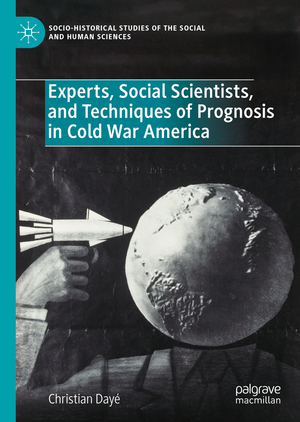
May 5, 2020
As can be evinced in the current COVID pandemia, one way in which modern societies react to times of insecurity is by addressing increased hopes to experts. This phenomenon has been in the focus of a recent book publication by Christian Dayé. Entitled Experts, Social Scientists, and Techniques of Prognosis in Cold War America (Palgrave, 2020), the book traces the origin of various techniques or social prognosis at the RAND Corporation, a U.S. think tank based in Santa Monica, CA. Among the techniques covered are the Delphi method and Political Gaming, two techniques that became central to the then nascent movement of future studies and are still widely used today in fields ranging from management studies to technology assessment and public health.
IAS-STS Fellowship Programme 2020-2021
April 2, 2020
The IAS-STS invites researchers to apply for a stay between 1 October 2020 and 30 June 2021 as a research fellow (up to nine months) or visiting scholar (shorter period, e.g. one month)!
Application Deadline extended to May 30, 2020
For application forms and further information please visit: IAS-STS.
Poster Exhibition Opening: Climate Crisis and Change in Awareness
March 9, 2020
On 4th of March accompanying their lecture series, the nine Styrian universities, under the leadership of the university network "Sustainability4U", presented a Styrian wide poster exhibition on the explosive thematic pair "Climate crisis and change in awarness".
State President Manuela Khom and representatives of the city of Graz and the Styrian university conference openend the exhibition at the Landhaus. The poster presentation then will be shown at the Styrian Universities.
The exhibition "Climate Crisis and Change in Awarenesss" shows problems and fields of action that exist in the context of the climate crisis and it focuses on important climate-related issues.
The first part of the exhibition deals primarily with the scientific side of the climate crisis. The second part is more about socio-economic and political aspects of the climate issue.
The climate crisis, among many other challenges, requires that - like in Paris Climate agreement and recorded in SDG 13 - immediate measures have to be taken to bring greenhouse gas emissions to 0 as quickly as possible so that the desired 1.5 - 2 ° C global average surface temperature warming compared to pre-industrial level can be achieved.
In addition to "technical" measures for decarbonization (the economy, energy supply etc.) needs a broad change in consciousness as to how it is active is demanded by civil society. Social innovations and cooperation at all levels are the order of the day.
Poster exhibition
Editor: University of Music and Performing Arts Graz (KUG) on behalf of the Styrian University conference
Conception of content: David Steinwender, MSc; Gregor Fallmann, BSc
Reviewer: Ass.-Prof. Dipl.-Ing. Dr. Günter Getzinger, TU Graz; Univ.-Prof. Mag. Dr. Karl Steininger, University of Graz
Graphic: Katja Melbinger, BEd, Andreas Balatka - Nextseason Werbeagentur
Content support: Moritz Steinbacher, BSc; Mag. Mario Diethart, Uniyersity of Graz
Lecture by Armin Grunwald: Climate Crisis and Change in Awareness
March 6, 2020
On March 4, Prof. Dr. Armin Grunwald, head of the Institute for Technology Assessment at the Karlsruhe Institute of Technology, the Sustainability4U lecture series, which was held for the first time by the Styrian university conference and offered by Günter Getzinger and Urs Hirschberg, with a lecture on "Climate crisis and change in awareness". His findings were initially negative: Despite detailed scientific knowledge, despite thirty years of political efforts, global CO2 emissions are increasing.
The Fridays for Future movement has raised the awareness of the population again, and yet there can be no talk of a radical, sustainable lifestyle change by the majority of the population towards more frugality. Nevertheless, Armin Grunwald closed his lecture optimistically: Politics - and it bears the main responsibility - must speak honestly about the costs of climate change, announce ambitious goals and necessary drastic steps early on, so that the economy and society can adjust to them in good time. A little bit reassuring: The contribution of technology to solving the problem is indispensable, but not sufficient.
Tool “Climcalc” – Becoming a climate-neutral university is possible

March 4, 2020
20 delegates from universities and universities of applied sciences from all over Austria gathered on March 3rd 2020 for the workshop “Greenhouse Gas Accounting for higher educational institutions”. The workshop aimed at giving basic information about how to create a greenhouse gas (GHG) balance and how to implement measures to reduce GHG emissions from an institutional point of view. In addition, the workshop provided the possibility to exchange experiences and clarify practical questions.
The project is carried out by the Graz University of Technology, the University of Life Sciences in Vienna of and the Environment Agency Austria, funded by the “Klima und Energiefonds” in Austria.
On the way to climate-neutrality
February 24, 2020
Universities and higher educational institutions can play a leading role in implementing ambitious climate protection measures according to the Paris Agreement. This requires first of all the creation of a balance of greenhouse gases.
Second, based on the balance, measures to become climate-neutral can be developed and implementated.
Within the project "Climate Protection at Universities - University GHG Accounting and GHG Reduction 2.0" of Graz University of Technology, Boku Vienna University of Technology and the Environment Agency Austria, universities, colleges and schools are supported in this process.
A workshop will be held on March 3rd 2020 to introduce the greenhouse gas accounting tool ClimCalc and to exchange experiences in the development of greenhouse gas reduction strategies.
Further information about the workshop is provided here.
Climate Crisis and Change in Awareness

February 11, 2020
Lecture by Univ.-Prof. Dr. Armin Grunwald, Karlsruhe Institute of Technology (KIT), Institute for Technology Assessment and Systems Analysis (ITAS)
Wednesday, March 4, 2020, 6 p.m., Aula TU Graz
Rechbauerstrasse 12, 1st floor
A change in awareness has been demanded since global environmental changes became known in the 1970s. A lot of time has passed by. Environmental and climate awareness have changed during this time, at least in many European countries. A lot has happened in technology too, if you compare the efficiency of today's cars with those of the past. And a lot has changed politically. But still, none of this seems to be enough. Emissions rise, the prospects for the future of the climate darken. What is going wrong here? Answers to this question would be the key to how we can do better.
The lecture wants to take this route a little bit.
This lecture is part of the lecture series Sustainability4U lecture series: "Climate crisis and change in awareness"
Welcome Nicki Cole
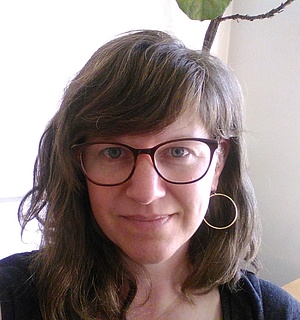
February 5, 2020
Nicki Lisa Cole, PhD is an American sociologist with expertise in consumer culture and global supply chains, with a particular focus on the production and consumption of electronics, sustainable and ethical production and consumption, and fair trade systems. She has worked at universities and research organisations in California, England and Austria.
Nicki was a researcher at the University of York (England) in the Department of Social Policy and Social Work and at the Stockholm-Environment Institute-York from 2017–2018 and before that was a funded Research Fellow for two years at IAS-STS. Before moving to Europe, Nicki was a Visiting Assistant Professor in the Department of Sociology at Pomona College in Claremont, California. She completed a PhD in sociology at the University of California-Santa Barbara in 2011.
Nicki’s research has been published in Race, Gender & Class, Contexts, and in the edited volume, Consumer Culture, Modernity and Identity. Her writing on Apple, Inc. has appeared in Truthout, CounterPunch, Sociological Images, and in the edited volumes Media Education for a Digital Education, and Censored 2014: Fearless Speech in Fateful Times.
We are happy to welcome Nicki Cole in our Team!
Milestones of Sociology

January 8, 2020
Milestones of Sociology by Christian Fleck and Christian Dayé looks back on the history of sociology and marks the decisive milestones in its development. These "milestones" - newly formulated ideas, the establishment or development of institutional arrangements, changing forms of cooperation or the introduction of new methods and research techniques - are presented in chronological order.
The Carbon Footprint of Unversities in Austria
December 12, 2019
Universities play a special part as role models. More and more universities are assuming their responsibility and are trying to help to reduce greenhouse gas emissions produced by universities.
With the Climcal method, developed by Alliance of Sustainable Universities in Austria, universities can gain a precise insight into those areas in which the majority of their greenhouse gas emissions occure. This method can monitor their development over the years and take effective measures that aim at a CO2 neutral university.
For more information on method, results and strategies for the reduction of greenhouse please see the article (in Gaia 4/2019) from Günter Getzinger, Dominik Schmitz, Sascha Mohnke, David Steinwender and Thomas Lindenthal.
Proceedings of the STS Conference Graz 2020

December 16, 2019
The annual STS Conference Graz provides a space for scholars from part of the world to present and discuss their research with peers.
In their papers, the conference participants address the complex ways in which science, technology and society co-involve and mutually shape one another.
The Social Life of Methods
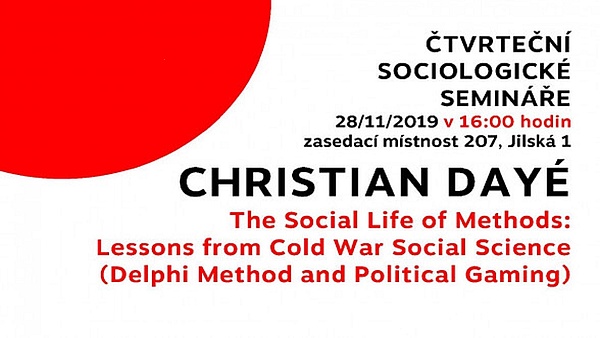
December 3, 2019
At the joint invitation of the sociological institutes of the Czech Academy of Sciences and Charles University, Christian Dayé gave a lecture in Prague at the end of November on" The Social Life of Methods: Lessons from Cold War Social Science.
Digital Health: what is changing for our understanding of health?

November 21, 2019
Bernhard Wieser discusses how the development of digital health technologies changes our understanding of health and illness. Of particular significance in the context discussed are the technologically mediated possibilities of seamless monitoring and a comprehensive simulation. Digital health technologies are changing not only the mode of intervention of medical action, but also what we call the autonomous subject. Health becomes a quantifiable goal and an optimization practice.
Call for Abstracts
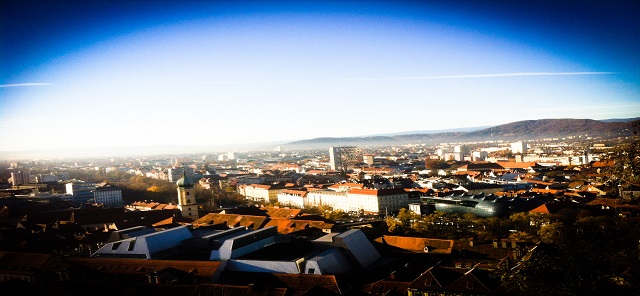
November 20, 2019
The Call for Abstracts for the upcoming STS Conference Graz 2020 is now open.
Please submit your abstract online!
Styrian school-ready screening: Trust him, he is the pilot!

October 15, 2019
The reference to the preliminary nature of the study does not change the responsibility of the researchers involved.
In a pilot phase in Styria, the school maturity of infants is determined by means of an App. Sociologist Christian Dayé (STS Unit of Graz University of Technology) points out the special relationship of trust between researchers and study participants in a guest comment (Der Standard, 14.10.2019).
Christine Wächter nominated for the Gabriele Possaner State Prize

October 10, 2019
Our colleague Christine Wächter was nominated for the Gabriele Possaner State Prize. This Prize is awarded to a person from the field of research and teaching, whose scientific achievements sustainability promote gender research in Austria.
Christian Dayé at the Austrian Sociological Association in Salzburg

October 7, 2019
At the recent conference of the Austrian Sociological Association (oegs.ac.at) in Salzburg (26 to 28 September 2019), Christian Dayé organized and chaired a lively plenary discussion on the past, present, and future of sociology in Austria. The panelists were (from right to left): Karin Scaria-Braunstein (University of Graz), Susanne Pernicka (Johannes Kepler University Linz), Frank Welz (University of Innsbruck), and Josef Langer (University of Klagenfurt).
Welcome
October 1, 2019
The STS Unit is growing steadily!
Wer are happy to welcome our new colleagues
Julian Anslinger, Michael Kriechbaum and Stefan Reichmann.
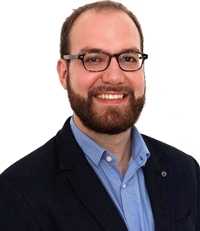


Call for Sessions
September 23, 2019
We invite you to submit a session proposal for the upcoming STS Conference, Critical Issues in Science, Technology and Society Studies, in Graz, held from 4 - 6 May 2020.
To this end, we suggest a number of thematic fields as a guideline to address contemporary challenges of the interplay between science, technology and society.
We would like to encourage session proposers to address one of these thematic fields.
The format of your proposed session does not need to be limited to academic paper and presentations. We encourage you to suggest interactive and innovative session formats, such as group discussions, world cafes, round tables, etc. Please specify your idea in case you plan an alternative setting by briefly describing it in your session proposal.
Please use this online form and submit your proposal by October 30, 2019.
Technology Assessment of Genome Editing
September 4, 2019
In a press conference organised on 28 August 2019 in Basel the Swiss-based foundation TA-SWISS presented the results of a technology assessment study which was conducted by an interdisciplinary Austrian-Swiss consortium. Armin Spök and Caroline Hammer, both members of the Science, Technology and Society Unit, were the TU Graz researchers involved.
The presentation was very timely, as the Swiss Parliament has recently started to explore the options and needs for legal action and policy development prompted by genome editing. In 2018 members of the consortium including Armin Spök were invited to the Swiss parliament to report in interim results of this study.
Genome editing encompasses a variety of molecular techniques allowing genetic modification of virtually all living beings with higher precision and at higher pace compared to conventional gene technology. Moreover, it allows minimal genetic modifications of e.g. in food crop plants - which at this point in time - cannot be distinguished from conventional breeding. The study investigated potential advantages of and challenges of applications of genome editing in human medicine, plant and animal breeding and for so called “gene-drives”. The latter are genetic elements which could very rapidly spread a desired genetic information in a population. This type of mechanisms could also be used to eradicate populations of carriers for disease such as Malaria.
The full study (in German language) can be ordered as a paper copy but is also available for free download as e-book version at https://vdf.ch/genome-editing-interdisziplinare-technikfolgenabschatzung-e-book.htm. Abridged versions are also available in German, English, French and Italian language (for English see https://www.ta-swiss.ch/KF-Genome-Editing-en-19_Web.pdf).
STS Austria Award for Early Career Publications
September 3, 2019
To support the research and visibility of early career researchers in Science and Technology Studies, STS Austria will award a prize for the best publications by young researchers.
Submission Deadline: October 15, 2019
STS-Courses: Winter term 2019/20
August 21, 2019
We are happy to announce the current courses of our STS Unit for the winter term 2019/20.
If not explicitly provided in the curriculum anyway, each course can be counted as a "free elective" by students of all disciplines of Graz University of Technology and University of Graz.
Students who are registered for a degree programme at a different Austrian university (e.g. University of Graz) and wish to take examinations at TU Graz must sign up as co-registered students. Further information
Ruth Oldenziel explores the bicycle city of Graz
May 29, 2019
On occasion of the 12th Austrian Cycling Summit from 27 to 29 May 2019 in Graz, we welcomed Prof. Ruth Oldenziel from the Technical University of Eindhoven. Ruth Oldenziel is one of the internationally most renowned experts in bicycle research and gave a keynote at the Graz Cycling Summit on the subject of "Century of Cycling: Pathways towards Sustainability". At the same time, Ruth Oldenziel used her stay to explore Graz on her TU Graz bike. We are pleased about your visit, which also gave us the opportunity to talk about future cooperation with the TU Eindhoven.
The Graz University of Technology was also represented at the 12th Austrian Cycling Summit with a keynote speech by Bernhard Wieser on the subject of "becoming a cycling capital - remaining a cycling capital". Interview with Bernhard Wieser
Save the date - STS Conference Graz 2020
May 10, 2019
Thank you to all who participated and contributed at this year´s conference. It was a pleasure to meet colleagues from more than 30 countries and from various disciplines to discuss critical issues in Science, Technology and Society Studies.
Save the date: STS Conference Graz 2020, May 4-6
STS Conference Graz 2019
May 3, 2019
From May 6-7 the 18th Annual STS Conference will take place again in Graz. We are looking forward to meeting colleagues to talk about Critical Issues in Science, Technology and Society Studies. A varied programme and exciting dicussions will await you.
The first conference day starts with a Keynote from Helge TORGERSEN, ITA/OEAW, Vienna
Back to the Future. Why we did, why we do and why we shall do TA
Further Keynotes:
Sabine Theresia KÖSZEGI, TU Wien
Artificial Intelligence - A Transformative Force: Facing the Challenges ahead!
Aglaiee DEGROS, TU Graz
The Peripherical Challenge. Territorial Justice and New Forms of Mobility

Helge Torgersen ©Walter Peissl Sabine, T. KÖSZEGI ©Luiza Puiu, Aglaee DEGROS ©Foto Hartlauer
The Anthropocene: Interdisciplinary Perspectives on a Crisis Diagnosis

April 30, 2019
Bernhard Wieser and colleagues have contribued the following book review: "The power of words. Anthropocene as a wake up call" (Christine Czakler, Robert Herrenbrück, Karl Novacek & Bernhard Wieser (2019): Die Macht der Worte. Anthropozän als Weckruf. In: Heike Egner & Horst Peter Groß (eds.): Das Anthropozän. München: Profil-Verlag, 94-132.).
The term Anthropocene stands for a comprehensive crisis diagnosis of global environmental change. It expresses that with our business practice we engage people in all biological, chemical and geophysical processes, so that the processes are irreversible. This is the approach for an interdisciplinary discussion for advanced students and teachers in a research-related teaching project at the Alpen-Adria-Universität Klagenfurt. This book includes perspectives on history, geography, information technology and technology and science research.
Podcast: The effects of technological innovations

April 4, 2019
At the beginning of April, a podcast was released on the Science, Technology and Society Unit (STS Unit). Günter Getzinger (Head of the STS Unit) reports on the effects of technical development on society, and provides insights into the research topics of the working group.
Institutes and colleagues, who are interested in these issues as well as in possible cooperation with our unit, are welcome to contact us.
Event series "In Focus" - The Ethical Challenges of Automated Driving
Feburary 11, 2019
The event series "In Focus" addresses ethical, political and legal questions in research. The kick-off event on March 11 deals with "The Ethical Challenges of Automated Driving" (moderated by Günter Getziner).
The TU Graz invites its researchers to a discussion about the ethics of automated driving. Automated driving will dominate future road traffic.This will be accompanied by a number of technical, political, legal and ethical challenges.
This event is a cooperation of the Institute of Automotive Engineering, the Science, Technology and Society Unit of the ISDS and the Office for Gender Equality and Equal Opportunity.
Monday, 11 March 2019, 2 p.m. to 6 p.m., Auditorium of TU Graz, Rechbauerstraße 12, 8010 Graz
Registration required: Armanda Pilinger: a.pilinger@tugraz.at
Teaching - Summer term 2019
February 7, 2019
Please take a look at our courses for the summer term 2019.
If you are interested in courses dealing with e.g. Technology Assessment, Theory of Data Science, Gender & Technology, and political & ethical aspects of technology be fast by booking your course!
Modelling Health

January 22, 2019
The Modelling Health project focused on Avatars in medicine. These new technologies offer completely new possibilities of medical practice as virtual assistance systems, e.g. in the field of care. At the same time, questions regarding data protection, acceptance and autonomy of users arise, such as Bernhard Wieser (TU Graz) and Martina Lang (IFZ) as part of the project team, emphasize.
The Ö1 Journal `Matrix - Computers and New Media’ (18.1.2019) was dedicated to this project and addresses the question of how this "artificial health twins" could change our lives.
Responsible of the broadcast: Sylvia Andrews
Interviewpartner: Bernhard Wieser / Sozialwissenschaftler /TU Graz; Ingeborg Holzer / Einsatzleiterin Volkshilfe Murtal, Martina Lang /Soziologin / IFZ Graz; Kurt Zatloukal / Med Uni Graz
Call for Abstracts - STS Conference Graz 2019
December 5, 2018
See our call for abstracs for next year´s STS Conference Graz 2019!
The conference provides a forum to discuss on a broad variety of topics – especially abstracts are encouraged which refer to aspects of the following sessions.
For submitting your abstract, please use the online form.
Submission Deadline: January 28, 2019
IAS-STS Fellowship Progamme 2019/2020

November 29, 2018
The IAS-STS fellowship programme 2019/20 is out now!
Applications have to be send to the IAS-STS by 28 February, 2019.
For further details please visit: http://www.ifz.at/ias/IAS-STS/Application
Stakeholder Consultation on the Future of Genome Editing in Germany and Europe
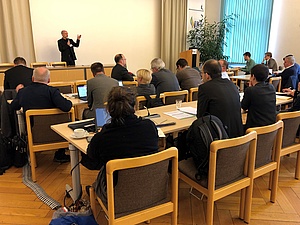
November 15, 2018
On 8 and 9 November 2018 Armin Spök and his team held a stakeholder consultation in Berlin to discuss opportunities and challenges for plant breeders, farmers, food and feed processors, regulators, and researchers to use of genome editing techniques in developing new plant varieties. According to a recent ruling of the European Court of Justice plants derived from genome editing are subject to the EU harmonised legislation on genetically modified organisms. This ruling is perceived by scientists and plant breeders to be a major hurdle for breeding innovation but welcomed by environmental organisations.
Armin Spök chaired the two-day consultation together with Matthias Arlt from the Max Planck Institute of Molecular Plant Physiology. The workshop was organised in the context of ELSA GEA project funded by the German Federal Ministry of Education and Research.
TU Graz expert invited to the Swiss Parliament

November 7, 2018
Alexander Lang, Institute for Advanced Studies, Vienna, Malte Gruber, University of Lucerne and Armin Spök from the TU Graz met in a hearing of the Committee on Science, Education and Culture of the Swiss Federal Council in Bern on the questions of parlamentarians on genome editing. Armin Spök is a consortium partner of a technology assessment project commissioned by the Swiss TA-Swiss Foundation on genome editing.
The Swiss Federal Council has announced its intention to adapt national genetic engineering legislation in order to adapt it to the new technological possibilities and challenges of genome editing.
Welcome Christian Dayé!
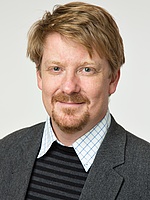
November 5, 2018
We are pleased to welcome Christian Dayé to the Science, Technology and Society Unit.
Before Christian Dayé worked at the Department of Sociology of the Universtity of Graz and the University of Klagenfurt. His main fields of research are Sociology of science, knowledge and technology, Responsible research and innovation, Social research methods and methodology and Social theory. Currently he is working on the EU-CHIC project led by Armin Spök.
Frontiers Guest Editor

February 28, 2018
Armin Spök was invited as Guest Associate Editor for a Special Issue on "Plant Genome Editing - Policies and Governance" jointly hosted by Frontierts in Plant Science and Plant Biotechnology, Biosafety and Biosecurity. In the field of plant sciences Frontiers runs a number of highly cited open access journals.
Open-Access Tage 2018
Call for Sessions - STS Conference Graz 2019

September 4, 2018
The STS Conference Graz 2019, May 6-7 is the joint Annual Conference of the Science, Technology and Society Unit - Graz University of Technology, the Inter-Disciplinary Research Centre for Technology, Work and Culture (IFZ) and the Institute of Advanced Studies on Science, Technology and Society (IAS-STS).
In our call for sessions we suggest the following thematic fields and we would like to encourage participants to think outside the box by combining thematic fields and considering potential intersections (interactive sessions formats, such as discussion groups, slow talks, etc. are welcome too).
For submitting your session abstract, please use this online form and send an abstract (max. 500 words) no later than October 31, 2018
Teaching - Winter term 2018/19

Postdoctoral Researcher - Deadline Extended
thematic focus: technology assessment and responsible development of genome editing Details regarding the position you will find here
Applications should be written in English and submitted by e-mail to office.sts@tugraz.at, Science, Technology and Society Unit, Graz University of Technology, no later than 24.08.2018.
STS Conference Graz 2018
From May 7 to May 8, 2018 the 17th Annual STS Conference took place in Graz.
The Science, Technology and Society Unit organized in cooperation with the IFZ Graz and the IAS-STS the 17th Annual STS Conference Graz. The conference offered the oportunity to present and dicuss a broad spectrum on themes in the area of digitalization of society, gender-technology and environment, sustainable food systems, life sciences/biotechnologies and much more.
About 200 reseachers from all over the world presented their work in this fields with a specific focus on critical issues in science, technology and society studies. Many thanks to all who contributed to the sucess of this event!



















